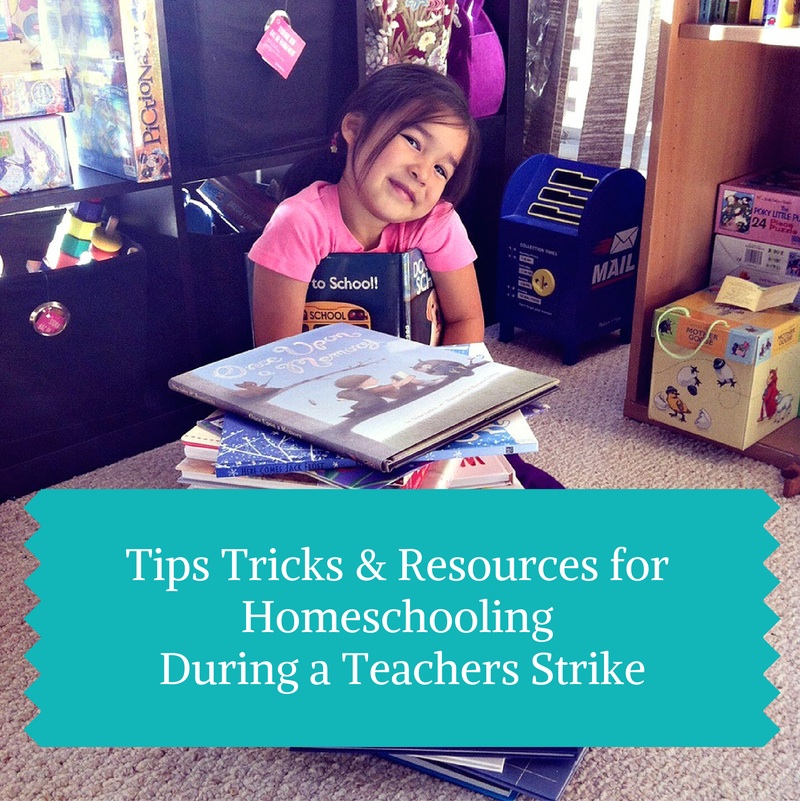Homeschooling. Maybe the word strikes fear in your heart- “Do I have enough patience to teach AND parent my children?” Perhaps the word gets you excited- Educating a child is a powerful thing. Regardless, with school on strike in BC many parents are starting to contemplate the idea of homeschooling their kids. Homeschooling resources are always a good tool to have in your back pocket, even if it isn’t something that you plan to do as a full time option. Supplementing your child’s education at home is a great way to give them a bit of extra help in areas that they struggle with and give them a leg up over the summer for the following school year.
We chatted with homeschooling expert Lisa Marie Fletcher, the creator of The Canadian Homeschooler and asked her to share some tips and tricks for parents who want to homeschool during the strike.
 10 Tips and Tricks for Homeschooling During a Teachers Strike:
10 Tips and Tricks for Homeschooling During a Teachers Strike:- Don’t go out and spend a ton of money on curriculum and materials. Try to keep it free/cheap and easy. In case the strike ends earlier than expected, or your child doesn’t learn the way that curriculum works, you don’t want to be out a lot of money.
- Expect that your school day isn’t going to look or feel the same as it is in a school setting. It won’t take as long (you might be done before lunch!), and you can sit on a couch or the floor (or in the tree!).
- Decide if you are going to simply follow your child’s interests and encourage them to learn as much as they can about it, or if you are going to try and follow the expectations of the government learning outcomes for their grade level. BC curriculum packages by grade can be found here.
- If you want to follow the guidelines, don’t stress too much about exact details or trying to figure out what each detail means. Look at the overall topic and use that as a way to start your plan. For example, in Grade 3 science they study plant growth. Plant a bean seed. Watch it and record the changes as it grows.
- Use local assets to your advantage – the library, museums and art galleries, tourist attractions, historical centres, etc. Read a lot. Play outside a lot. Learn together.
- Daniel Roizman of Hiyu had a few great suggestion for parents – Ensure you learn how to tether your laptops to your phones so they can work and homeschool from anywhere. Kids can get extra focus while camping or being on the beach.
- Have the kids watch a movie, then write a report on it and do a bit of research before too.
- Cooking – plan dinner. Have your child pick a theme (mexican, bbq, etc.), research recipes, make a list of ingredients, go shop and then prepare. You can also spread it across a few days (planning day 1, shopping day 2, cook day 3). Include some info on nutrition, organic or gmo and turn it into a science and math project.
- Our publisher was on CTV news with a few more suggestions of ideas for learning while helping the household. A few neat ideas included exploring impressionist and Mondrian-styled art in colours of the kids bedrooms, leaning about chemical reactions and preserving through canning, using a swiffer duster for a cleaning competition, making fairy houses for the garden, and scrapbooking and writing summer vacation memories.
- We also love the stop-motion lego app to inspire creativity and hone film-making skills.
 Considering homeschooling? Here are some great resources to help you get started:
Considering homeschooling? Here are some great resources to help you get started:- The Canadian Homeschooler– A site dedicated to sharing and providing Canadian resources to homeschooling families including Canadian materials, curriculum, products and websites that are relevant and useful to families across the country in their home education journeys.
- Kids Activities Blog– A site created by a part-time homeschooling mom who shares activities that she has both created and collected for her sons education.
- Reading A-Z– Thousands of downloadable, projectable, printable teacher materials, covering all the skills necessary for effective reading instruction.
- Teachers Pay Teachers– On this site, real teachers sell activity sheets and curriculum plans that they have created for a variety of subjects.
- Khan Academy– Provides “a free, world-class education for anyone, anywhere.” Subjects include math, science, arts and humanities, chemistry, computer science and more. For beginner learners to adult education.
- StarFall– A wonderful online tool that can be used on the computer or ipad to teach kids to read with phonics.
- Time For Learning- A student-paced online educational tool covering preschool through high school. Popular as a homeschool curriculum, an afterschool alternative to tutoring, and for summer skill building.
- Super Teacher Worksheets– Printable worksheets for teachers, parents, tutors, and homeschool families.
- Happy Hooligans- A website for arts, crafts and activities for kids from Toddler to Preschooler.
- World As We Knew It- Read your way through Canadian history with Canadian literature.
- World Bank of 1200 high-usage words for spelling.
Are you considering homeschooling your child? Do you already homeschool? We’d love for you to share your homeschooling experiences and what resources are your favourite for educating your children at home.

